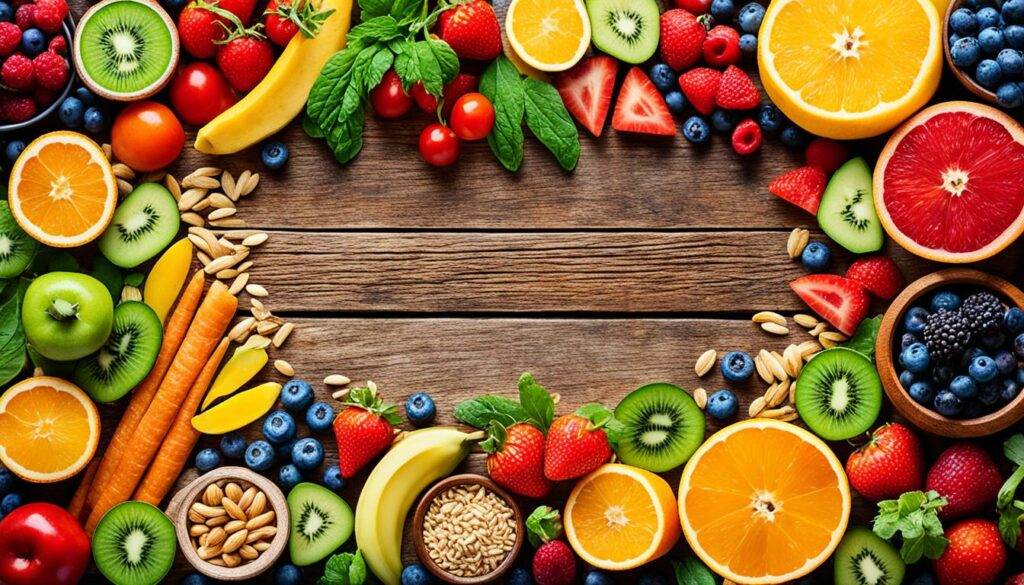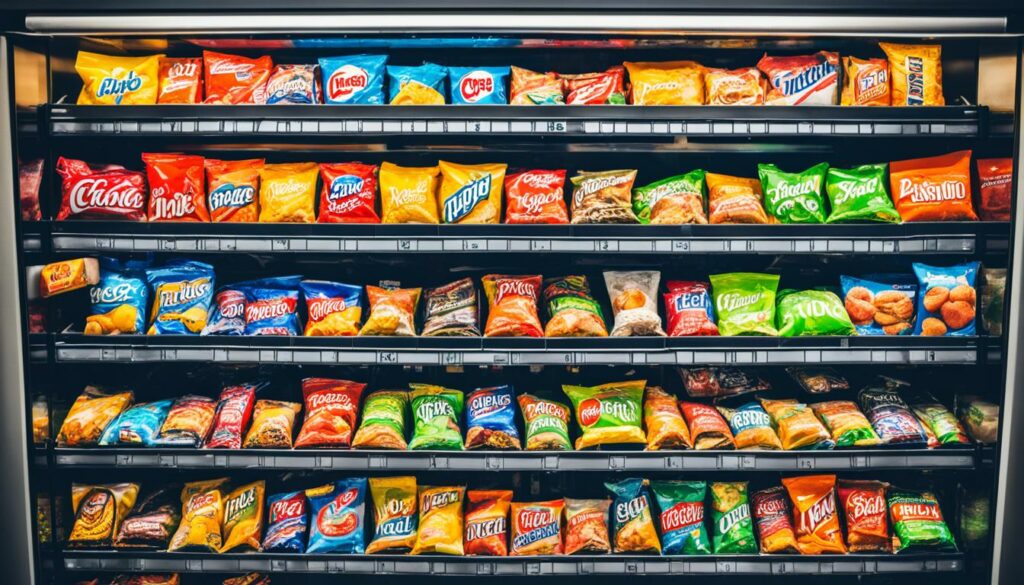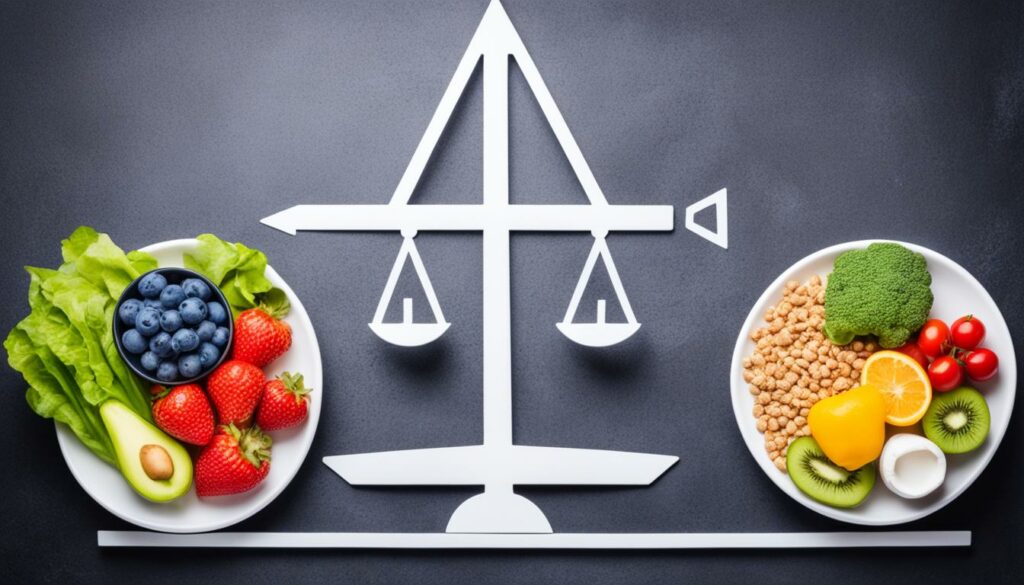A Teens’ Guide to Healthy Lifestyle Choices
Adolescence is an exciting and transformative stage of life, where young people navigate their journey into adulthood. During the teenage years, often referred to as the adolescence stage, teenagers undergo significant physical and mental changes, shaping their development and influencing their future. It is a time when they explore their identities, establish relationships, and begin to make decisions that will impact their lives.
Understanding the importance of healthy lifestyle choices during this critical stage is essential for a teens’ overall well-being. By making informed decisions about nutrition, exercise, and wellness, young adults can not only navigate the challenges of teenage development but also establish lifelong habits that promote optimal health and vitality.
Key Takeaways:
- Adolescence is a crucial stage of development, marked by significant physical and mental changes.
- Making healthy lifestyle choices during the teenage years is essential for long-term well-being.
- Nutrition, exercise, and wellness play a vital role in maintaining a healthy lifestyle during adolescence.
- By establishing healthy habits and seeking support when needed, teens can create a foundation for a bright and healthy future.
- It is crucial to prioritize open communication, parental guidance, and professional support to help teens navigate through the challenges and transitions of adolescence.
Understanding Energy and Nutrient Needs

During adolescence, teenagers experience rapid growth and development, which requires adequate energy and nutrients. The body uses calories from foods and drinks as energy to support growth, physical activity, and overall functioning. A healthy eating plan for teens should include a variety of nutrient-dense foods, such as vegetables, fruits, grains, protein foods, and dairy. These foods provide essential vitamins, minerals, fiber, and protein to support optimal health during this stage of life.
As teenagers go through the critical phase of adolescence, meeting their energy and nutrient needs becomes crucial. The body requires calories obtained from food and drinks to support growth, physical activity, and overall functioning. A well-balanced and healthy eating plan for teens should consist of a diverse range of nutrient-rich foods.
To meet their energy needs, teenagers should focus on consuming:
- Fruits and vegetables: A colorful variety of fruits and vegetables provides essential vitamins, minerals, and antioxidants to support growth and development.
- Whole grains: Foods like whole wheat bread, brown rice, and oatmeal are rich in fiber, vitamins, and minerals, providing sustained energy throughout the day.
- Protein foods: Lean meats, poultry, fish, eggs, beans, and nuts are excellent sources of protein necessary for muscle growth and repair.
- Dairy: Milk, yogurt, and cheese are rich in calcium, which is essential for building strong bones and teeth.
“A well-balanced and healthy eating plan for teens should consist of a diverse range of nutrient-rich foods.”
In addition to providing the necessary energy, these foods also supply essential vitamins, minerals, fiber, and protein. Nutrient-dense foods like vegetables and fruits are packed with antioxidants that protect against disease. Whole grains are high in fiber, aiding digestion and maintaining a healthy weight. Protein foods help build and repair tissues, while dairy products contribute to strong bones and teeth.
By incorporating these nutrient-dense foods into their diet, teenagers can ensure they are meeting their energy and nutrient needs, promoting their overall health and development.
| Food Group | Examples |
|---|---|
| Vegetables | Broccoli, carrots, spinach |
| Fruits | Apples, bananas, berries |
| Grains | Whole wheat bread, brown rice, oats |
| Protein Foods | Chicken, eggs, beans, nuts |
| Dairy | Milk, yogurt, cheese |
Choosing Healthy Foods and Beverages

When it comes to making food choices, teenagers should prioritize nutrient-rich options. Including a variety of vegetables, fruits, whole grains, and lean protein sources in their diet is essential for healthy growth and development. These foods offer a wide range of vitamins, minerals, and fiber that promote overall well-being.
Vegetables are packed with essential nutrients and antioxidants that support a strong immune system and protect against various diseases. Incorporating colorful vegetables like kale, spinach, bell peppers, and carrots into meals and snacks can provide a plethora of health benefits.
Fruits are not only delicious but also rich in vitamins, minerals, and fiber. Including fruits like berries, citrus fruits, apples, and bananas in their diet can satisfy their sweet cravings and provide a natural source of energy.
Whole grains, such as brown rice, whole wheat bread, and quinoa, are excellent sources of fiber and essential nutrients. These grains can help maintain a healthy digestive system and provide sustained energy throughout the day.
Lean protein sources, including chicken, turkey, fish, eggs, and legumes, provide the necessary building blocks for muscle growth and repair. Adding protein to meals and snacks can help teenagers feel full and satisfied, promoting healthy weight management.
By prioritizing these healthy food choices, teens can ensure they are getting the necessary nutrients for their growing bodies and establish lifelong habits of eating well.
| Food Group | Examples |
|---|---|
| Vegetables | Kale, spinach, bell peppers, carrots |
| Fruits | Berries, citrus fruits, apples, bananas |
| Whole Grains | Brown rice, whole wheat bread, quinoa |
| Lean Protein Sources | Chicken, turkey, fish, eggs, legumes |
Limiting Unhealthy Foods and Beverages

While maintaining a balanced diet is essential, it is equally important to be mindful of the consumption of unhealthy foods and beverages. These items are often high in added sugars, saturated fats, and sodium, which can have negative effects on a teen’s health. By limiting the intake of such products, teenagers can reduce their risk of weight-related health problems and improve their overall well-being.
One of the main culprits to watch out for is added sugars. These sugars can be found in a variety of processed foods, from sugary snacks to sweetened beverages. Excessive sugar consumption can lead to weight gain, dental issues, and an increased risk of chronic diseases such as diabetes and heart disease.
In addition to added sugars, saturated fats are another concern. These fats are often found in fried foods, processed meats, and high-fat dairy products. Consuming too much saturated fat can lead to elevated cholesterol levels and an increased risk of heart disease. It is important to opt for healthier fat sources, such as avocados, nuts, and olive oil, in order to maintain a balanced diet.
Sodium is another ingredient that should be limited in a teen’s diet. Processed foods, such as canned soups, packaged snacks, and fast food, are often packed with sodium. High sodium intake can contribute to high blood pressure and an increased risk of heart disease. Encouraging teens to choose fresh, homemade meals and snacks can help reduce their sodium intake.
Sugary drinks, such as soda and fruit juices, should also be consumed in moderation. These beverages are often high in added sugars and lack the nutritional benefits found in whole fruits. Encouraging teens to opt for water, unsweetened tea, or natural fruit-infused water can help reduce their intake of sugary drinks.
“By limiting the intake of unhealthy foods and beverages, teens can reduce their risk of weight-related health problems and improve their overall well-being.”
Recommended Servings for a Healthy Diet
| Food Group | Recommended Daily Servings |
|---|---|
| Vegetables | 2-3 cups |
| Fruits | 1.5-2 cups |
| Grains | 6-8 ounces |
| Protein Foods | 5-6.5 ounces |
| Dairy | 3 cups |
By focusing on nutrient-rich foods and limiting the intake of added sugars, saturated fats, sodium, and sugary drinks, teens can make healthier choices that support their overall well-being. Empowering them to develop good habits during their formative years can pave the way for a lifetime of optimal health.
The Role of Physical Activity

In addition to healthy eating, regular physical activity plays a crucial role in a teen’s overall well-being. Engaging in physical activity provides numerous benefits, ranging from physical health to mental and emotional well-being. It is recommended that teenagers aim for at least 60 minutes of moderate to vigorous physical activity each day.
Aerobic activities, such as running or biking, are excellent ways for teens to increase their heart rate and improve cardiovascular fitness. These activities include exercises that involve continuous movement, such as jogging, swimming, or dancing. Aerobic activities help strengthen the heart and lungs, improve endurance, and boost overall energy levels.
Strength training exercises, on the other hand, focus on building muscle strength and improving bone health. These exercises involve working against resistance, such as using free weights, machines, or bodyweight exercises like push-ups and squats. By incorporating strength training into their routine, teenagers can develop strong muscles, increase bone density, and enhance their physical performance.
The Benefits of Physical Activity
Regular physical activity offers a wide range of benefits for teens:
- Builds strong muscles and bones
- Maintains a healthy weight
- Improves cardiovascular fitness
- Reduces the risk of chronic diseases, such as obesity, type 2 diabetes, and heart disease
- Enhances mood and reduces the risk of mental health issues, such as anxiety and depression
- Improves sleep quality
- Increases confidence and self-esteem
It’s important for teens to find physical activities they enjoy and make them a regular part of their routine. Whether it’s playing a sport, taking dance classes, or going for a bike ride, making physical activity fun and engaging increases the likelihood of it becoming a lifelong habit.
Recommended Guidelines for Physical Activity
The recommended guidelines suggest that teens should engage in at least 60 minutes of moderate to vigorous physical activity every day. Here is a breakdown of the recommended activity levels:
| Type of Activity | Frequency | Duration | Intensity |
|---|---|---|---|
| Aerobic Activity | Most days of the week | At least 30 minutes | Moderate to vigorous |
| Strength Training | At least 3 days a week | 20-30 minutes per session | Moderate to high |
It’s important for teens to listen to their bodies and adjust the intensity and duration of their physical activity based on their fitness levels and abilities. Additionally, incorporating activities that promote flexibility and balance, such as yoga or stretching exercises, can further enhance overall physical fitness.
“Physical fitness is not only one of the most important keys to a healthy body, but it is also the basis of dynamic and creative intellectual activity.” – John F. Kennedy
Prioritizing Sleep

Sleep is often overlooked but plays a vital role in a teens’ overall health. Teenagers need an adequate amount of sleep to support their physical and mental well-being. The recommended hours of sleep for teens are between 8-10 hours per night. Sleep deprivation can lead to various health issues, including fatigue, poor concentration, mood swings, and compromised immune function.
Establishing good sleep hygiene practices, such as maintaining a regular sleep schedule and creating a relaxing sleep environment, can greatly improve the quality of sleep.
Safely Managing Weight

Weight management is a common concern for some teens, but it’s important to approach it in a safe and healthy manner. If a teen needs to lose weight, it is recommended to do so under the guidance of a healthcare professional to ensure it is done safely and effectively.
“Crash diets and extreme weight loss methods can be harmful to a teen’s physical and emotional well-being.”
Instead of resorting to quick fixes, adopting healthy eating habits, engaging in regular physical activity, and maintaining a balanced lifestyle can support healthy weight management in the long run.
The Dangers of Crash Diets
Crash diets, which often involve severe calorie restriction, can lead to a host of negative consequences. These unsustainable diets can:
- Impair physical growth and development
- Decrease energy levels
- Compromise the immune system
- Damage self-esteem and body image
“It’s crucial to prioritize a teen’s physical and emotional well-being throughout their weight management journey.”
Healthy Eating Habits
Adopting healthy eating habits is key for managing weight in a sustainable way. Encourage your teen to:
- Eat a variety of nutrient-dense foods, such as fruits, vegetables, whole grains, and lean protein sources
- Avoid skipping meals
- Practice portion control
- Stay hydrated by drinking water instead of sugary beverages
“By focusing on nourishing the body with wholesome foods, teens can achieve and maintain a healthy weight.”
Regular Physical Activity
Engaging in regular physical activity is another important component of weight management. Encourage your teen to find activities they enjoy, such as:
- Aerobic exercises like running, swimming, or dancing
- Strength training exercises to build muscle
- Incorporate physical activity into their daily routine
“Physical activity not only helps manage weight but also boosts mood, energy levels, and overall well-being.”
Maintaining a Balanced Lifestyle
Weight management shouldn’t be the sole focus of a teen’s life. It’s important to maintain a balanced lifestyle that includes:
- Getting enough sleep for proper rest and recovery
- Managing stress through relaxation techniques and hobbies
- Building a positive body image and self-esteem
Tips for Adopting Healthy Habits
Adopting healthy habits is all about making positive lifestyle choices. However, teenagers may encounter challenges on their journey due to peer influence, media influence, and the newfound independence they gain during adolescence. In order to help teens navigate these challenges and make healthy choices, parental support and guidance are crucial.
Encouraging open communication is key to understanding the needs and concerns of teenagers. By creating a safe and non-judgmental environment, parents can empower teens to express their thoughts and emotions. This open dialogue can help in addressing any misconceptions about health and fostering a deeper understanding of the importance of healthy habits.
“Parents and caregivers play a critical role in guiding teenagers towards healthy choices. By being actively involved and supportive, they can help shape their child’s behavior and promote positive habits.”
Involving teens in meal planning and preparation is another effective strategy. By including them in the decision-making process, teens can learn about nutrition and take pride in preparing their own meals. This hands-on approach not only instills a sense of responsibility but also encourages a deeper appreciation for the importance of balanced and nutritious food choices.
Promoting a positive body image is essential for teenagers to develop a healthy relationship with their bodies. Encouraging self-acceptance and emphasizing that beauty comes in all shapes and sizes can help teens build confidence and prioritize self-care. Media literacy can also play a role in combating unrealistic beauty standards and fostering a positive mindset.
The Power of Peer Influence
Peer influence can greatly impact a teenager’s behavior and choices. It is important for parents to recognize the influence of friends and peers and encourage teens to surround themselves with individuals who prioritize healthy habits. Providing opportunities for teens to engage in group activities that promote active lifestyles can be beneficial.
Overcoming Challenges
Maintaining a healthy lifestyle can be challenging, especially during the teenage years. Teens face various barriers that can hinder their progress, such as time constraints, lack of motivation, and stress. However, with effective strategies and support, these challenges can be overcome.
Time Management
One of the biggest barriers for teens is managing their time effectively. Between school, extracurricular activities, and social commitments, it can be difficult to find time for healthy habits. To overcome this challenge, it’s important for teens to prioritize their tasks and create a schedule that allows for dedicated time towards their wellness goals. By setting aside specific time slots for exercise, meal preparation, and self-care activities, teens can integrate healthy habits into their daily routine.
Motivation
Another common challenge is maintaining motivation over time. It’s normal for motivation to fluctuate, but finding ways to stay inspired is essential. One strategy is to set realistic goals that are achievable and measurable. Celebrating small victories along the way can help teens stay motivated. Additionally, finding activities and exercises that they enjoy can make the journey towards a healthy lifestyle more enjoyable and sustainable. This could include joining sports teams, dance classes, or exploring outdoor recreational activities.
Stress Management
Teens often experience high levels of stress due to academic pressure, peer relationships, and other responsibilities. Managing stress is crucial for maintaining a healthy lifestyle. Encouraging teens to practice stress management techniques, such as deep breathing exercises, meditation, or engaging in creative outlets like art or music, can help them cope with stress in a healthier way.
“The greatest challenge is not the obstacles we face but our mindset towards conquering them.” – Unknown
By developing effective time management strategies, finding motivation, and practicing stress management techniques, teens can overcome the challenges they face and stay committed to their healthy habits. It’s important for parents, caregivers, and educators to provide support and encouragement throughout this journey, helping teens build resilience and develop lifelong skills for managing challenges.
| Common Challenges | Strategies for Overcoming |
|---|---|
| Time constraints | – Prioritize tasks – Create a schedule – Set specific time slots |
| Lack of motivation | – Set realistic goals – Celebrate small victories – Engage in enjoyable activities |
| Stress | – Practice stress management techniques – Deep breathing exercises – Meditation – Creative outlets |
Seeking Professional Support
In some cases, teens may benefit from seeking professional support to receive additional guidance and expert advice. Healthcare professionals, such as dietitians and mental health specialists, can provide personalized guidance to help teens make informed decisions about their health and well-being.
A healthcare professional can offer valuable insights into nutrition and healthy lifestyle choices, helping teens develop a well-balanced and nourishing diet plan. By collaborating with a professional, teens can receive personalized advice tailored to their specific needs.
Mental health support is also crucial for teens who may struggle with body image issues, disordered eating, or other mental health concerns. Consulting with a professional in this field can provide teens with the necessary guidance and support to navigate these challenges.
Seeking professional help ensures that teenagers receive comprehensive and evidence-based guidance to navigate their unique health needs. Whether it’s receiving guidance from a dietitian or accessing mental health support, professional assistance can play a crucial role in empowering teens to make informed decisions about their well-being.
By seeking professional support, teens can benefit from:
- Guidance from healthcare professionals who specialize in nutrition and mental health
- Personalized advice and recommendations for a healthy lifestyle
- Access to evidence-based strategies to address specific concerns
- Professional support to overcome challenges and develop healthy habits
A healthcare professional can provide personalized guidance and support to help teens make informed decisions about their health and well-being.
| Benefits of Seeking Professional Support | Explanation |
|---|---|
| Guidance from healthcare professionals | Receive expert advice from professionals specialized in nutrition and mental health |
| Personalized advice | Get tailored recommendations for a healthy lifestyle based on individual needs |
| Evidence-based strategies | Access proven techniques to address specific concerns and challenges |
| Professional support for healthy habits | Receive ongoing assistance to overcome obstacles and maintain a healthy lifestyle |
Conclusion
Adolescence is a critical time for developing healthy lifestyle habits that can have a long-lasting impact on a person’s well-being. During this stage, prioritizing nutrition, physical activity, sleep, and overall self-care is crucial for teenagers to establish lifelong healthy habits.
By making conscious choices about the foods they eat, engaging in regular exercise, getting adequate sleep, and taking care of their mental and emotional well-being, teenagers can lay the foundation for a healthy lifestyle that extends far beyond their teenage years.
Parents, caregivers, and healthcare professionals play a vital role in supporting teenagers on this journey. With their guidance and support, teens can navigate the challenges of adolescence and embrace a healthy lifestyle. By instilling healthy habits and providing resources and professional advice when needed, we can empower our teenagers to prioritize their well-being and thrive.
Ultimately, a healthy lifestyle is not just about the teenage years; it sets the stage for a lifetime of well-being. So let’s come together to support our teenagers in cultivating healthy habits that will benefit them throughout their lives.
FAQ
What is adolescence?
Adolescence is a stage of development where teenagers experience significant physical and mental changes.
Why is making healthy lifestyle choices important during adolescence?
Making healthy lifestyle choices during adolescence is important for overall well-being and establishing lifelong habits.
What should be included in a healthy eating plan for teens?
A healthy eating plan for teens should include a variety of nutrient-dense foods, such as vegetables, fruits, grains, protein foods, and dairy.
What are some examples of nutrient-rich foods?
Nutrient-rich foods include vegetables, fruits, whole grains, and lean protein sources.
How can unhealthy foods and beverages be limited?
Unhealthy foods and beverages, high in added sugars, saturated fats, and sodium, should be consumed in moderation.
How much physical activity should teens aim for?
Teens should aim for at least 60 minutes of moderate to vigorous physical activity per day, including aerobic activities and strength training exercises.
How much sleep do teens need?
Teens need between 8-10 hours of sleep per night for optimal physical and mental well-being.
How can weight management be safely approached for teens?
Weight management should be approached in a safe and healthy manner, with guidance from a healthcare professional.
How can parents and caregivers support teens in adopting healthy habits?
Parents and caregivers can provide support and guidance by encouraging open communication, involving teens in meal planning and preparation, and promoting a positive body image.
What are some strategies for overcoming challenges in maintaining healthy habits?
Strategies for overcoming challenges include time management, setting realistic goals, finding enjoyable physical activities, and practicing stress management techniques.
When should professional support be sought?
Professional support should be sought when additional guidance is needed, such as from healthcare professionals or mental health support, to address specific nutrition or mental well-being concerns.
Why are healthy lifestyle habits important during adolescence?
Healthy lifestyle habits established during adolescence can have a long-lasting impact on a person’s well-being and promote a brighter future.







